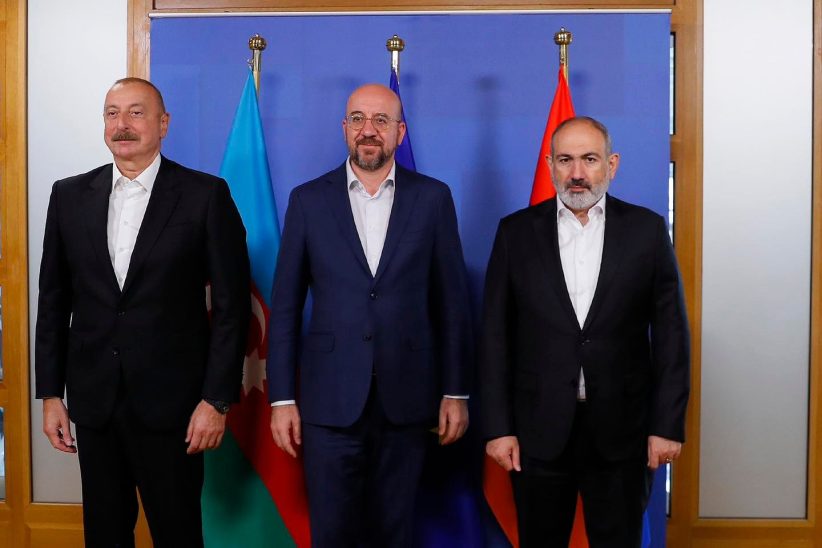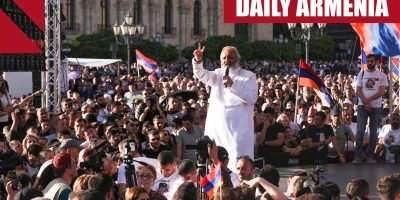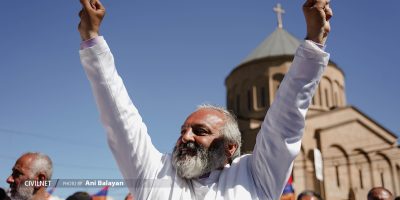By Mark Dovich
The European Union has said there is “important momentum” on a peace treaty after the latest round of talks between the leaders of Armenia and Azerbaijan.
European Council President Charles Michel characterized Saturday’s summit in Brussels as “frank, honest and substantive,” but made no indication Yerevan and Baku had made any concrete progress toward a deal.
Michel said Armenian Prime Minister Nikol Pashinyan and Azerbaijani Ilham Aliyev had only “reconfirmed their commitment” to resolving a host of issues, including mutual recognition of territorial integrity and border delimitation.
To that end, Pashinyan told reporters in May he is prepared to recognize Azerbaijan’s claims to Nagorno-Karabakh, provided that guarantees are made for the rights and security of the region’s more than 100,000 Armenians.
Read more: Thousands rally in Karabakh against blockade
That came after a summit in Prague last October, where Pashinyan and Aliyev committed to a 1991 treaty saying that international borders between former Soviet countries should be based on communist-era administrative boundaries.
‘CURRENT STATE OF AFFAIRS NOT SUSTAINABLE’
Turning to the issue of Nagorno-Karabakh, which sits at the heart of the decades-long conflict between Armenia and Azerbaijan, Michel said, “The current state of affairs is clearly not sustainable and is in no one’s interest.”
He called on Azerbaijan to reopen the Lachin corridor, the sole overland route between Nagorno-Karabakh and Armenia. The road has been blocked to nearly all traffic for more than seven months. Michel also noted Azerbaijan’s “willingness to provide humanitarian supplies via Aghdam,” a town on the border of Nagorno-Karabakh and Azerbaijan.
Before the Brussels talks, Azerbaijani Foreign Minister Jeyhun Bayramov told the Red Cross his country stands ready to send “essential goods” to Nagorno-Karabakh via Agdam, which Yerevan ceded to Baku after the 2020 war.
“I see both options as important and encourage humanitarian deliveries from both sides,” Michel said.
Michel added the EU supports “dialect dialogue” between Baku and Stepanakert on the issue of Nagorno-Karabakh’s Armenians’ rights and security, but did not say those talks should be mediated by a third party.
Pashinyan has repeatedly called for an “international mechanism” to guide Baku-Stepanakert negotiations. Bayramov rejected that prospect in an interview with Reuters last month.
WHAT DOES IT ALL MEAN?
“Azerbaijan continues to dictate the agenda in the negotiations, imposing both its own vocabulary and its own ideas on all key issues,” analyst Tigran Grigoryan wrote in a column for CivilNet after the talks.
He continued: “By putting the issue of delivering ‘humanitarian’ supplies from Agdam to Nagorno-Karabakh on the same level as the issue of opening the Lachin corridor, Michel has actually legitimized Azerbaijan’s blackmail and created a new opportunity for Baku not to make concessions.”
“There is the impression that Armenia’s vital interests are simply not adequately represented during the negotiations under way,” Grigoryan added.
WHAT’S THE CONTEXT?
In recent years, the EU has taken on a substantially more active role in the region, alongside longtime mediators Russia and the United States.
Before the 2020 Nagorno-Karabakh war, decades of internationally mediated talks spearheaded by the Minsk Group failed to reach a diplomatic solution to the conflict between Armenia and Azerbaijan. The group, which is co-chaired by France, Russia, and the United States, still exists on paper but in practice has not functioned since the war ended.
There has been a significant uptick in diplomacy in the region since May, with senior officials from Armenia and Azerbaijan meeting for talks in Brussels, Moscow, Washington, and Chişinău, Moldova. Those negotiations all ended in no discernible progress toward a peace deal.
‘TREATY SHOULD BE PREPARED IMMEDIATELY’
As Pashinyan and Aliyev gathered in Brussels Saturday, Russia’s Foreign Ministry issued a statement expressing concern over the humanitarian crisis unfolding in Nagorno-Karabakh and urging Azerbaijan to lift its blockade of the region.
“A peace treaty between Baku and Yerevan should start being prepared immediately,” the ministry said.
In an apparent dig at Pashinyan, the statement continued: “We respect the Armenian leadership’s sovereign decision (to recognize Azerbaijan’s claims to Nagorno-Karabakh). However, this has radically altered the fundamental conditions under which (the 2020 ceasefire) was signed, as well as the position of the Russian peacekeeping contingent deployed to the region.”
WHAT COMES NEXT?
Michel said he invited Pashinyan and Aliyev to a follow-up meeting in Brussels “after the summer,” as well as to a summit with French President Emmanuel Macron and German Chancellor Olaf Scholz in Spain in October.
It was not immediately clear if Pashinyan and Aliyev accepted those invitations.
















